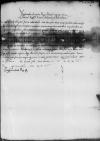Letter #1665
Sigismund I Jagiellon to Ioannes DANTISCUSTarnów, 1537-07-10
| received [1537]-07-20 Manuscript sources:
| ||||
Text & apparatus & commentaryPlain textText & commentaryText & apparatus
Reverendo in Christo patri, domino
Reverende in Christo pater sincere nobis dilecte.
Ante duos plus minus annos facultate nobis concessa per Clementem septimum pontificem maximum nominavimus ad canonicatum et praebendam aut dignitatem, personatum, administrationem vel officium, quod vel quae in mense pontificio vacare contigisset in ecclesia cathedrali Varmiensi, Stanislaum Hosium iuris utriusque doctorem, cuius et paper damaged⌈[et]et paper damaged⌉ parentis Ulrici multa fuerunt erga nos merita, et ipse quoque cancellariis nostris serpiendo nullos scribendi labores declinavit. Quare hac de re Paternitatem Vestram certiorem faciendam putamusmus. Cuius canonicatus Varmiensis cum vacaturus nunc sit in mense pontificio per assecutionem episcopatus, postulamus a Paternitate Vestra, ut eo in personam Stanislai Hosii cedere velit, quo possit minore negotio, absque ullo iuris strepitu, iure nominationis nostrae potiri. Fecerit Paternitas Vestra pro officio suo magnamque ea re a nobis gratiam inierit. Quae bene valeat.
Dat(ae) or Dat(um)⌈Dat(ae)Dat(ae) or Dat(um)⌉
in


 BCz, 1601, p. 304
BCz, 1601, p. 304